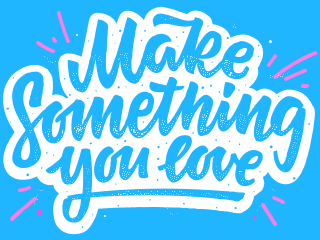Originally published on JOTFORM.COM
Cozy.
That’s how I felt.
Tucked beneath what may have been the world’s softest blanket.
I took a deep breath and rolled onto my side. It was a familiar moment — the moment when my 6 a.m. alarm clock sounded, after a night of tossing and turning.
The moment when my daily responsibilities had yet to beckon me. The moment when the clouds of my imagination felt more real than writing lines of code.
In a few minutes, I would answer the same question I had faced every weekday for the past year:
"Should I stay in bed or should I work on my side business?"
At the time, I was working as a programmer for an NYC media company.
Balancing a full-time job with the responsibilities of scaling my startup, JotForm, taught me a lot about myself.
Among other things, I learned that I was somewhat risk-averse.
The typical path of raising venture capital wasn’t appealing to me. Additionally, as someone who highly values personal freedom, I didn’t want to make myself beholden to anyone.
This meant two things:
- I had to prioritize profitability from day one.
- In order to experience consistent gains, I had to consistently beat my arch-nemesis: procrastination.
"My biggest realization? The reasons we avoid completing a task, in any given moment, are extremely personal. And commonly touted “productivity hacks” don’t always cut it."
I want to share my experience of overcoming procrastination while scaling a side project into a company that now employs more than 130 people.
But before diving in, it might be interesting to take a look at how two types of founders handle procrastination: VC-backed founders vs bootstrappers who build their startups without any outside funding.
Are bootstrappers more likely to procrastinate?
Bootstrappers like myself aren’t the only entrepreneurs who sometimes grapple with the snooze button.
However, VC-backed founders may have a slight psychological advantage when compared to their bootstrapping counterparts: The pressure that comes with taking someone else’s money.
But that’s not all.
VC-backed founders are motivated to “pay investors back” sooner rather than later for another reason: Once a company has grown accustomed to a certain level of spending, scaling back becomes next to impossible.
Should the company fail to gain traction within 12 to 18 months, it could very well become another failure statistic.
Thus, the VC-backed founder who doesn’t feel like sending out emails Monday morning has every incentive to do so.
Conversely, the bootstrapper must learn how to push through procrastination — without the motivating force of a ticking clock and a room full of unhappy investors.
I encountered this learning curve while building JotForm in 2006. It was my first year in business, and my bedroom served as the company headquarters.
While I loved what I was building — a user-friendly form builder to help organizations enhance productivity — the temptation to procrastinate sometimes got the best of me.
Whether it was the lull of my comfy bed or the laughter promised by a favorite TV show, my home office was riddled with distractions.
During this time, I read many books about entrepreneurship, productivity, and procrastination. Sometimes their advice worked for me, and other times it didn’t.
The real reasons we procrastinate
When I became especially curious about the topic of procrastination, I often wondered:
"Why do we delay doing the tasks that get us closer to the things we say we want?"
Through self-observation, one thing became clear: There was always a reason for my procrastination.
Whenever I noticed the urge to put something off, I tried to ask myself “why.” Surely enough, my mind always answered.
Once I had identified the real problem — that was causing the feeling of avoidance — I could develop an appropriate plan of action to reclaim my productivity.
As simple as it sounds, identifying the root problem is somewhat contrary to common advice. The internet is filled with articles that advise us to push through feelings of resistance.
Heidi Grant, a social psychologist, and Harvard Business Review contributor, echoes this sentiment:
“Somewhere along the way, we’ve all bought into the idea, without consciously realizing it, that to be motivated and effective we need to feel like we want to take action… I really don’t know why we believe this, because it is 100 percent nonsense.”
While I completely agree and have often written about how organizational systems can enhance productivity, I believe something extremely important is often overlooked:
"Productivity hacks are only effective when we know why we’re avoiding something in the first place."
“Just do it” isn’t a sustainable solution for beating chronic procrastination. If we repeatedly find ourselves avoiding certain tasks, an underlying problem needs to be addressed.
Once we identify the real cause, we can search for the right productivity hacks and solutions to meet our needs.
Here are the most common reasons that I figured often lead us to procrastinate:
1. We feel like we’re not making progress.
Think back to the last time you started a new project. You probably felt excited about executing that new marketing strategy, blog content idea, or programming stack.
Fast forward a couple of weeks, and you now find yourself approaching the same task with a twinge of discouragement.
Observe your procrastinating mind in action, and it’s probably saying something like: My hard work isn’t being rewarded; this isn’t fun.
Science says humans are intrinsically more motivated by instant gratification than delayed gratification. Considering that worthwhile projects are rarely built overnight, this tendency is annoyingly inconvenient. The solution?
Stanford University behavioral scientist and lecturer BJ Fogg recommends creating systematic behavioral changes that correspond with “small wins.”
In other words, create your own way to celebrate small milestones. According to Fogg, every task should be accompanied by “a trigger” — and the easier the action better.
Say you’re committed to writing content for your new website. You might make an agreement with yourself to write one paragraph after each time you use the restroom, and continue to follow this trigger throughout the day.
Once you’ve completed the task, Fogg urges you to celebrate in a predetermined manner. The celebration could be as simple as treating yourself to a piece of chewing gum or as active as taking a bike ride through a favorite part of town.
Treat the series of actions like a game:
Trigger → Task → Celebration.
Why does this work? Creating small wins provides an incentive to keep working toward the finish line. Eventually, the actions create a habit that may become enjoyable.
2. We’re not sure where to start.
Another common reason for procrastination? Having so much to do that we’re not sure where to begin.
During the early days of building JotForm, I wasn’t always sure what to work on. With seemingly endless tasks begging for my attention, I often ended up “procrastinating” with low-value activities.
Based on my conversations with other founders, I know my experience was far from unique. A lack of organizational systems leads to unnecessary feelings of overwhelm, confusion and avoidance.
Here’s the key:
a) Acknowledge that it’s normal to feel uncertain when beginning something new.
b) Brainstorm with mentors, advisors, and friends how to best prioritize your time.
The more systems we put in place, the less we find ourselves procrastinating. I’m reminded of the importance of this each year when I visit my family. They own a small olive farm that runs like a well-oiled machine.
Everyone knows what needs to happen first, second and third when we harvest the fruit. With no room for guesswork, procrastination is virtually non-existent.
3. We’re afraid of failing.
This is the unofficial mantra of Silicon Valley tech founders.
"Fail fast, fail often."
However, look beneath the surface, and a different image will emerge: ambitious entrepreneurs who are terrified of making a bad decision.
As one anonymous insider shared with management consultant and Forbes contributor Rob Asghar:
“Many people here do talk about embracing failure, but that’s usually just hype. Many of them fear any kind of failure, and the pressure to succeed is so intense that some new businesses instead find themselves looking for shortcuts.”
While some founders cope by taking shortcuts, others stall out due to perfectionism. The tendency shows up in the form of delayed launch dates, missed deadlines, and “productive procrastination.”
During the early days, it wasn’t uncommon for me to spend a ridiculous amount of time on tasks that didn’t really matter.
Meanwhile, I was missing out on opportunities to grow our customer base, forge business partnerships, and help even more organizations enhance their productivity with user-friendly forms.
This was another reason I made the controversial decision to forego venture capital. I knew the pressure of a board looking over my shoulder would clash with my inner perfectionist.
Does that mean I never procrastinated for fear of failure? No — but I could be gentle with myself when it happened.
“It’s not necessarily the sky-high standards that slow you down, but the sky-high standards mixed with a belief that your performance is tied to your self-worth,” says Ellen Hendriksen, Boston University Psychologist. “That combination can grind you to a halt.”
Hendrickson recommends that we should consistently remind ourselves of the crucial difference between who we are and what we achieve.
Easier said than done, but it’s sound advice.
4. We dislike the task itself
Surprise, surprise — the most common reason for procrastination may actually be disliking the task at hand.
It’s no secret that building a business involves several moving parts. Understandably, everyone enjoys some tasks more than others.
One person may have an affinity for
campaigns, while another would rather play in traffic.
In such instances, HBR contributor Heidi Grant recommends using something she calls “if-then planning.” The process involves identifying the specific steps needed to complete a task and — most importantly — where and when you will do it.
For example: If it’s 11 a.m. then I will stop what I’m doing and cold email prospects.
Grant claims the process is different than relying on sheer willpower alone.
Personally, I find it more effective to ask targeted questions:
What could happen if I complete this task?
What could happen if I don’t complete this task?
What is my overarching vision? Why does it matter?
Once I reconnect with my goals and remind myself of the potential outcomes, I’m back on track. Obviously, there is no “right way” to deal with procrastination.
These are just some of the methods that have worked for me over the years. Everyone has unique personality quirks, internal motivations, and reasons for procrastinating.
Translation: The newest productivity hack everyone is raving about may not work for you. And that’s okay.
Identify your personal reasons for procrastinating, apply the best-suited advice and ignore the rest.
Oh, and do your best not to hit snooze — no matter how cozy your bed might feel.





